A rooftop in the middle of downtown Syracuse may be the last place people think of as a place of healing, but that’s exactly what an ESF professor and graduate student have built at the top of the Syracuse VA Medical Center.
The Therapeutic Horticulture Rooftop Garden uses the connection between nature and health to benefit veterans. Started by Chemistry Department chair Dr. Lee Newman and graduate student/Interim Associate Director for ESF in the High School Daniel Collins, the program has been impacting the lives of veterans for 10 years and has expanded to other veteran and care facilities in the area.
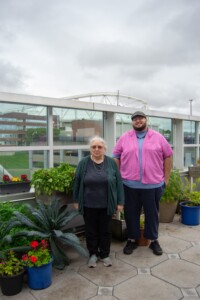
Dr. Lee Newman and Daniel Collins
The idea for the program was planted years before Newman came to ESF while teaching a course in plant technologies and came across the area of horticulture therapy.
“I kept thinking, ‘If I wasn’t doing phytoremediation, I’d be doing this full time,’” Newman said. After that, she would propose the idea to her graduate students every semester with no takers until Daniel Collins ‘21 came to ESF for his Ph.D.
“I went through the whole spiel, and I get to the end and Dan’s like ‘That one! That’s what I want to do!’ and I thought, ‘Finally a student that wants to do this!’” she said.
Planting Community Seeds
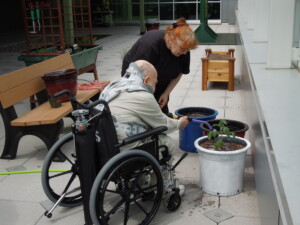
Wanting to work with veterans, Newman and Collins reached out to the Syracuse VA Medical Center and found the perfect partner in Dr. Steven Lebduska ‘76, head of the spinal trauma unit and ESF grad.
Lebduska offered them the roof over the VA’s Regional Spinal Cord Disorder Center for the program, and the Therapeutic Horticulture Rooftop Garden program found its home. It transformed into a welcoming gathering space for veteran patients and family members, with plants and gardening-related activities that help improve their health, well-being, and psychological outlook.
With no budget for plants or supplies, Newman and Collins got resourceful. They asked stores that sold large potted plants and trees for containers from plants that had died. Collins painted the pots red, white, and blue and the planting began. Vendors at the CNY Regional Market offered them deep discounts once they heard of the program’s goals. They also received funding from private groups including The Gifford Foundation, the ESF Alumni Association, and the Central Square Women’s Auxiliary of the American Legion.
“People have been supportive of the program and the number of students who have been involved has been fantastic,” Newman said.
Nurturing Meaningful Connections
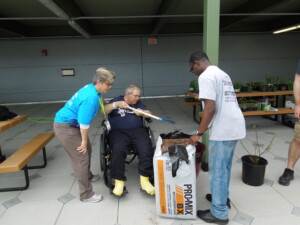
Numerous students have volunteered during the program’s 10-year history. For some, it fits into their academic path such as pre-med, but others become involved because they find it a worthwhile endeavor.
“We’ve had several biotech and environmental bio students interested in the plants,” said Newman. There was an environmental education and interpretation major who developed care guides so patients can see what the different plants are and how to care for them. Several landscape architecture students helped design the gardens at Clear Path for Veterans when the program expanded to that location.
“It doesn’t have to be connected directly to their curriculum,” said Collins. “They just have to want to get involved.”
Newman is quick to credit Collins for his role in the program’s longevity.
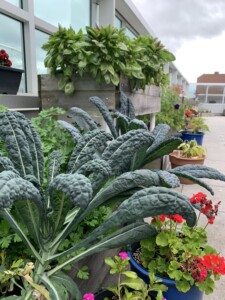
“Dan is the one that has been keeping it going, he’s the one that maintains contact and organizes activities with the students to do this program. And he has just done a phenomenal job. If it wasn’t for Dan, this program would not have developed the way that it did.”
The veterans aren’t the only ones taking ownership, the students develop their own sense of ownership preparing presentations, materials or making suggestions for activities.
“It really opens up that chance for them to take on new projects with some guidance and build new skills,” said Collins. He’s asked students to prepare presentations and workshops on topics such as composting and growing strawberries.
“By giving them that chance to explore what they want to do and find something they’re passionate about is a way to make it their own,” he said.
Branching Out and Refocusing the Research

Once the program took root at the VA, representatives from Clear Path for Veterans approached Newman and asked if they could start a program at the Chittenango facility.
This request was followed by requests from three other care facilities in Onondaga County. “And we were still getting people contacting us saying, ‘Hey, could you help us?’” Newman said.
COVID slowed some aspects of the program as facilities had to limit visitors, but it also led to a new focus on the research.
The project’s original focus – the effect working with the plants has on the veterans – shifted. As Newman and Collins noticed the program’s mutual benefits, they are taking a look at the impact it has on the student volunteers.
“The benefits of the program flow in both directions,” said Newman. “The residents love working with the students, and you can’t really appreciate how much goes on until you’re out there watching the students and the vets, or the students and the residents at the other facilities working with each other. It is fantastic to be a part of something like this.”
That’s where the idea about the students came from, explained Collins. When he and Dr. Newman returned from their weekly visits to the VA or other sites, they noticed a marked change in their moods and attitudes. “I thought that’s probably true for our students too,” said Collins.
Collins is now surveying former student volunteers and gathering data on the benefits they received from the program.
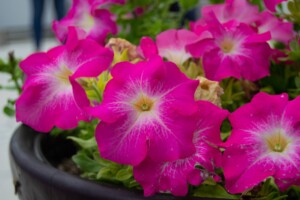
“Since Covid, several papers have come out about the benefits of nature on health,” he said, “so how do we differentiate ourselves?”
One thing they noted was most places with similar programs have a sole practitioner or a therapist working with the recreational therapist or other staff members, but ESF is possibly one of the only programs that involve undergraduate students like this.
As more data is released regarding the health benefits of connecting with nature, Newman and Collins see their research as adding something new to the field.
“We see it every day that we go over to the VA or go to one of the care facilities and see how people come out to participate, and by the end of the time they’re smiling, they’re laughing, they’re joking around with us. We see this every time we work with the patients and residents,” said Newman.”
“We wanted to contribute to that research that’s coming out of other countries primarily, of looking at how this reconnecting with nature just benefits people in so many ways,” said Newman.
She and Collins hope to develop a certificate program as a way to expand the program beyond Central New York. “Dan and I are just two people and he’s going to graduate eventually,” said Newman. “So how can we get other people trained to have these opportunities at more places and just keep it going?”


